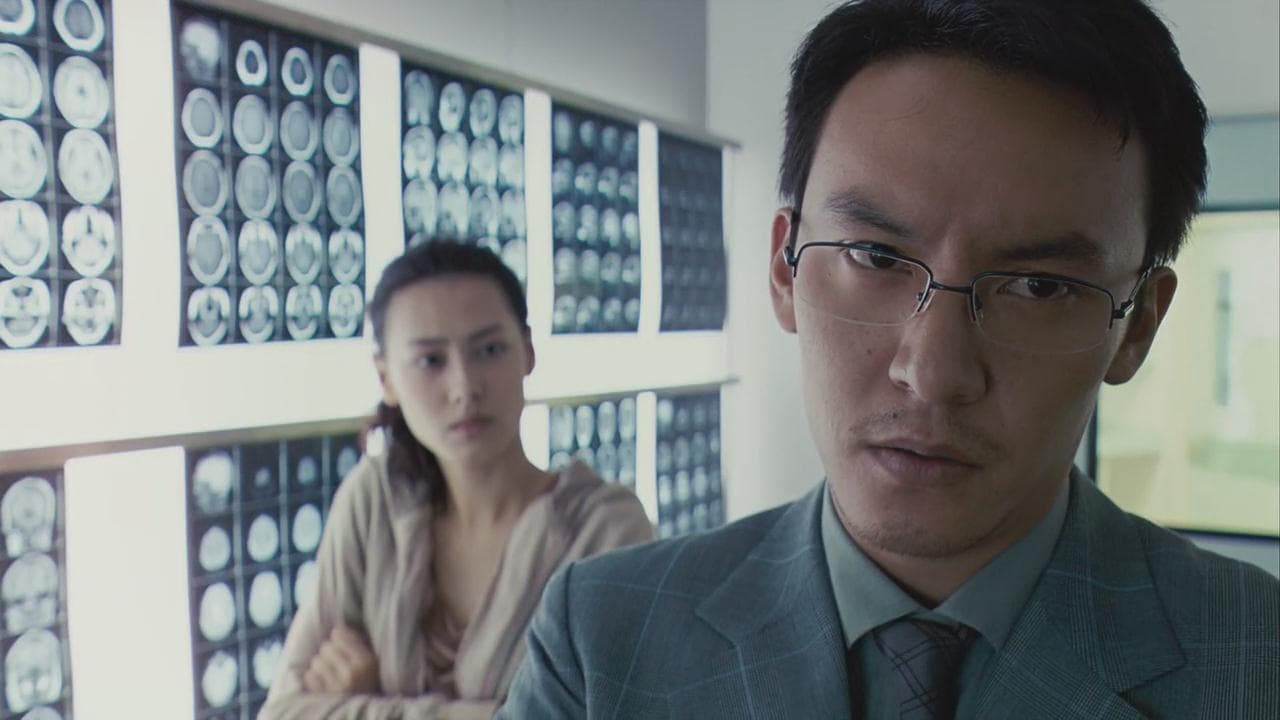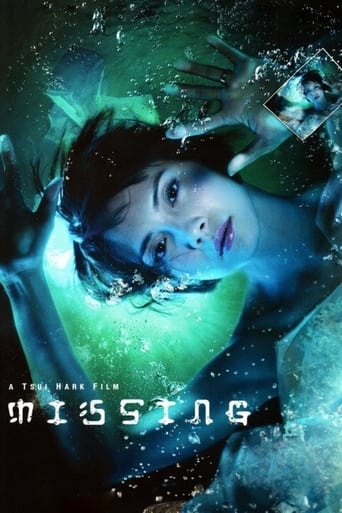ShangLuda
Admirable film.
BelSports
This is a coming of age storyline that you've seen in one form or another for decades. It takes a truly unique voice to make yet another one worth watching.
Blake Rivera
If you like to be scared, if you like to laugh, and if you like to learn a thing or two at the movies, this absolutely cannot be missed.
Roxie
The thing I enjoyed most about the film is the fact that it doesn't shy away from being a super-sized-cliche;
Claudio Carvalho
In Hong Kong, Dr. Gao Jing (Lee Sinje) is introduced to the brother of her best girlfriend Chen Xiao Kai (Isabella Leong), the photographer and diver Dave Chen Guo Dong (Guo Xiao Dong). They fall in love for each other and Guo Dong invites Gao Jing to travel to Taiwan to visit an ancient submarine city, where he intends to propose her. During the dive, Guo Dong vanishes and his headless body is found later while Gao Jing cannot recall what happened underwater. She decides to investigate and a bleak mystery is disclosed."Sam Hoi Tsam Yan" is a messy, boring and melodramatic never-ending ghost story. The screenplay is awful, with many ridiculous twists where nothing is what seems to be. This movie is so terrible that gives the sensation that will never end. The only good point is the wonderful cinematography. The absurd plot in IMDb is totally wrong. My vote is two.Title (Brazil): "Mergulho Fatal" ("Fatal Dive")
dbborroughs
Woman is left to pick up the pieces after her photographer boyfriend goes missing and is discovered dead on a working vacation that was to be the time he proposed to her.There are questions as to whether the body is his and she begins to try and unravel what had happened to her boyfriend.Strange and pretty much a mess of a film bounces through time and space as the woman begins to have visions and relive past events. I think. Frankly I'm not sure what the hell was going on.Certainly the events make for some great looking images, but the plot is not really clear. I kind of lost interest about half way in and just kind of went with it hoping for an "ah ha" moment that would make it all make sense and make me want to back it up and try again. It never happened. I know many people who dislike the film are calling it further proof of the directorial ability of Tsui Hark. I'm not so sure partly because some of the sequences work beautifully, but more because Hark has never been a great director. To be certain he's directed some great, or near great films (Peking Opera Blues, We're going to Eat You, Butterfly Murders), but for the most part he is a better producer than a director (He produced John Woo's Better Tomorrow films and Bullet in the Head, The Chinese Ghost Story films among others). I don't think he's declined as a director. I just think he picked a poor script.
ebossert
Angelica Lee and Isabella Leong investigate the enigmatic death of a loved one at sea in this film by Tsui Hark. The visuals and camera-work are excellent, with some cool sequences filmed underwater. (Seriously, the cinematography is exceptional.) The ghouls are very unusual and are "touched up" with some CGI. The storyline is very engaging, with multiple elements introduced to keep the viewer off balance. Some have criticized the film for being schizophrenic, but this method of storytelling is actually effective, interesting, and adds some unpredictability. The romantic elements are on the cheesy side, but this film simply does not deserve the abuse it has taken from online reviewers. It maintains interest from start to finish; and sometimes that's good enough.I normally wouldn't bother writing a review for a film I rate a 6/10, but the sheer level of abuse this film has received from IMDb reviewers is surprising. "Missing" is so unpretentious and harmless that I question how someone in their right mind could hate the film to the degree of giving it a 1/10 rating. Then again, these are the same people who gave Jet Li's pretentious, over-dramatic fluff piece "The Warlords" (2007) a 10/10 (as well as Woo's pathetic "Red Cliff") – so maybe I'm expecting a little too much individuality when dealing with the bandwagon jumpers that infest IMDb. In all honesty, I find that the average ratings on this website have become almost completely useless.After calling "Missing" a complete mess, one reviewer claimed that only those who liked "Diary" (2006) could buy into this movie. This was an obvious attempt to indirectly trash both films by drawing a parallel between two "convoluted" story lines with "copout" endings. One can only assume that this guy has no idea what he's talking about. "Diary" is a masterpiece of horror cinema that is on a level far higher than that of "Missing." The twists and turns in "Diary" are well-executed with little in terms of ambiguity; almost every single event is adequately explained. "Missing", on the other hand, includes a twist that tosses a good portion of the film into subjective interpretation. I say this in defense of "Diary" so that readers understand that the comparison is completely unwarranted and misguided.I do find it ironic that overpraised directors like David Lynch can operate within a universe where virtually everything is tossed up to subjective interpretation, yet receive heaping amounts of praise for being original and innovative. How is this any different from what Tsui Hark does in "Missing"? Sure, the big twist that's revealed during the latter third of the film basically forces the viewer to interpret the preceding events in a symbolic light, but some of it does have very specific psychological meaning. That still leaves the final third of the film to operate within objective reality, which is far more than what Lynch provided in the abhorrent "Eraserhead." So what's the problem? "Missing" is not nearly as weird as "Eraserhead", but it sure makes a LOT more sense, yet it somehow is excluded from receiving credit for using ambiguity to provoke thought and introduce originality. I'm not understanding this double standard.Now, I'm not saying that "Missing" is a great film. It's got some healthy doses of cheesiness and some of the events that take place during the opening hour may not hold up well after a second viewing, but there is a constant aura of interest that is maintained from start to finish – which is more than one can say for the seemingly endless barrage of carbon-copy Chinese historical epics like "The Warlords" and "Three Kingdoms" that quite frankly have NO originality, NO enjoyability, NO artistic integrity, and NO purpose for existing other than to ape Hollywood with soulless garbage masked behind a veil of massive budgets.I'll take a film like "Missing" over those pathetic projects any day of the week. I may not recommend a blind buy, but a rental with reasonable expectations is not something to run away from.
Harry T. Yung
ADDITIONAL SPOILER WARNING It's a double irony: it has been suggested in the movie that the protagonist Dr KO Tsing, a psychiatrist, is schizophrenic, something that can be said about the movie itself which cannot quite make up its mind whether to be a love story or a horror thriller. Actually, there shouldn't be a problem for a movie to be both but here the two elements repel each other like oil and water. Another flaw is that there is such a proliferation of borrowed ideas that it compels you to wonder where the originality of director Tsui Hark has gone.The openings scenes are delightfully lucid, an elegant depiction of how a young women CHAN Siu-hoi (Isabella Leung) brings together her photographer brother Kwok-tung and Tsing, both dedicated professionals who have little time for romance but a common interest in diving. As the relationship develops and blossoms, we see the three planning a diving trip to explore a sunken, mysterious ancient kingdom.Abruptly, the next shot brings us to a desolate funeral as we learn that Kwok-tung had died underwater in the adventure while Tsing has had a partial loss of memory of what happened. What ensues, the main body of the movie, is a psychological thriller with an "I see dead people" diversion, and also a distinct "Ghost" (1990) flavour. As the array of mysteries and twists are gradually disentangled, we are finally handed an overriding twist that is not unlike the cop out in movies like "Vanilla sky" (2001). What you've seen in this entire segment is only in Tsing's mind. The accident did happen, but the rest is what she constructs in her mind to try to explain everything.In the third and final segment, we see how Tsing, discharged from the psychiatric hospital and under the care of Siu-hoi, has completely lost her memory. Here, we see a remarkable resemblance to "Floating landscape" (2003) which depicts how a women whose fiancé had died of illness goes to his home town to look for a landscape of white blossoms that he had loved, and in the process discovers more about him. Here, Tsing needs to re-discover Kwok-tung from square one, and the landscape here is "feng loi" ("paradise" in Chinese), in a photograph taken from inside his small hideaway cabin on an idyllic beach, focusing on a small island in the middle of the ocean.The thriller part of the movie is somewhat contrived. The love story should have been better, particularly with the good performance of Angelica Lee, but suffers from lacking a sufficient development before the man dies, as you see in "Ghost". Angelica Lee did as much as anybody could, and the beautiful music (particularly the theme song) helps. In the end, this movie brings flashes of ideas and scenes that remind you of what director Tsui can do, but is on the whole a disappointment.

